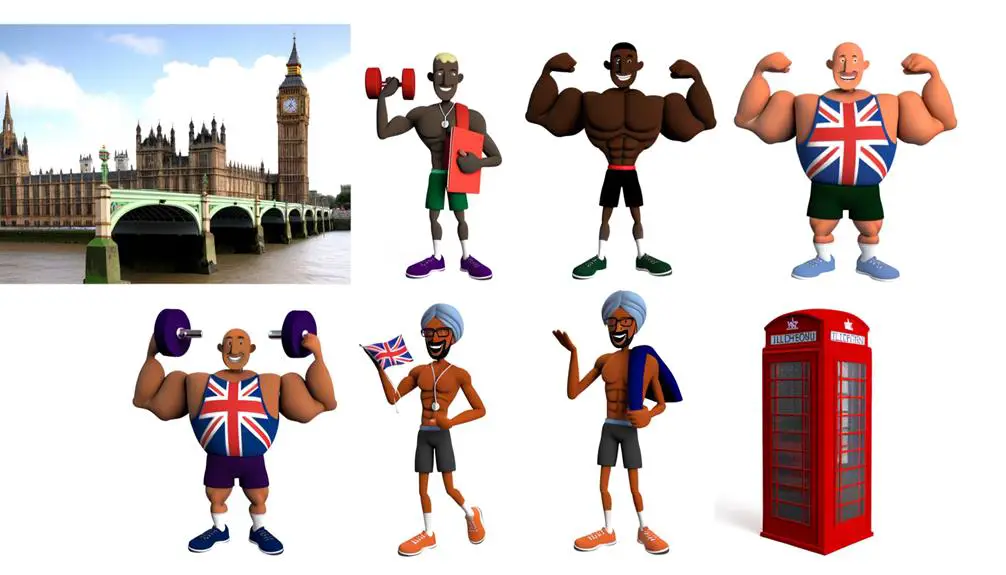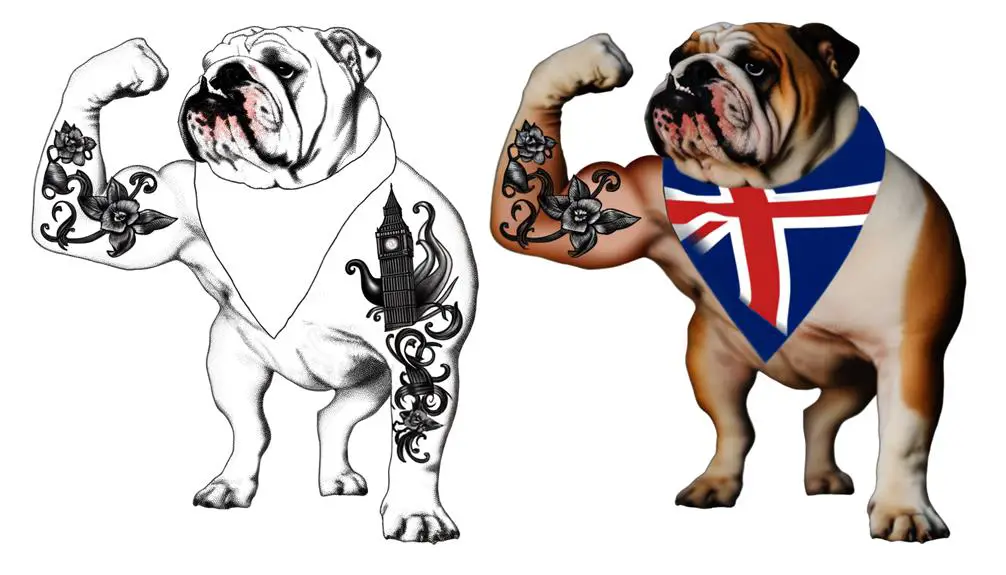In British slang, when you're described as 'buff,' it signifies you're physically attractive, pointing to a well-toned and fit body. This term's evolution from its 18th-century origins, relating to the undyed leather used in military attire, reflects a significant shift in linguistic and cultural values towards physical fitness and aesthetic appeal. This shift is influenced by celebrity culture, fitness trends, and a broader societal emphasis on health and vitality. 'Buff' transcends mere fitness jargon, cementing its place in everyday language and pop culture, symbolizing an idealized form of personal excellence and strength. Understanding its nuanced usage offers insight into contemporary values and ideals.
Key Takeaways
- 'Buff' in British slang refers to being in good physical shape or having a well-toned body.
- It signifies physical attractiveness, often associated with fitness and strength.
- Evolved from its original meaning related to undyed leather to denote aesthetic and physical appeal.
- Used in both casual and formal contexts to describe someone's physical fitness or attractiveness.
- Reflects societal values emphasizing physical fitness and the aesthetic appeal of a muscular physique.
Origins of "Buff"

The term 'buff,' in British slang, originated from the early 18th century, reflecting a nuanced evolution in language that underscores the dynamic interplay between cultural shifts and linguistic adaptation. This analysis explores the etymology of 'buff,' tracing its roots back to the material origins associated with the military and, subsequently, its color associations. Initially, 'buff' referred to a soft, thick, undyed leather made from the hides of various animals, prominently buffalo. The utility of this leather in military garb, particularly in the form of buff coats worn by English soldiers, cemented its significance within the lexicon.
As the material's prevalence in society grew, so did the term's application, shifting from a strict material reference to encompass color associations. The distinctive light tan shade of the original buff leather began to inform the broader use of 'buff' to describe similar hues. This change from a material to a color descriptor exemplifies the fluid nature of language, adapting to reflect changes in societal usage and perception. Through this lens, one observes the intricate relationship between the evolution of material culture and linguistic expression, offering insight into how language mirrors the material and conceptual landscapes of its speakers.
"Buff" Meaning Attractiveness
Over time, 'buff' has evolved beyond its material and color connotations to signify physical attractiveness, marking a significant shift in its linguistic journey. This transformation reflects broader societal values, particularly the increasing premium placed on physical fitness as a marker of beauty and desirability. In this context, 'buff' is no longer just a descriptor of a polished surface or a light tan hue; it has become a succinct accolade for a well-toned, physically fit body.
The ascendancy of celebrity culture has further entrenched 'buff' within the lexicon of attractiveness. Celebrities, often hailed as paragons of beauty and fitness, have played a pivotal role in popularizing rigorous exercise regimes and healthy lifestyles aimed at achieving a 'buff' physique. This celebrity influence has not only amplified the desire for physical fitness but has also made 'buff' an aspirational term, connoting both the aesthetic appeal of muscular definition and the discipline required to attain such a state.
Hence, 'buff' encapsulates a confluence of physical appeal and the virtues of self-care and discipline, reflecting an evolving societal ideal that prizes both the aesthetic and the ethic of physical fitness.
Usage in Everyday Language

Incorporating 'buff' into everyday language, you'll find its usage extends beyond fitness circles, becoming a versatile term that reflects broader cultural narratives around physical attractiveness and self-discipline. This linguistic evolution signifies a shift in societal values, where the emphasis on physical fitness and aesthetic appeal permeates various facets of daily communication. You'll observe 'buff' being employed in both casual and, increasingly, formal contexts, underscoring its acceptance into mainstream language.
The term's adaptability in conversation mirrors the dynamic nature of language itself, showcasing how slang terms can gain legitimacy over time. In formal contexts, 'buff' might still retain a playful undertone, yet its usage is progressively seen as appropriate, particularly in discussions surrounding health, wellness, and personal improvement. This acceptance into formal discourse highlights the term's journey from niche slang to a recognized descriptor of physical condition or attractiveness.
Moreover, 'buff' serves as a linguistic marker of cultural shifts towards valuing health and aesthetics. Its widespread use across different contexts, from casual chats to more structured discussions, illustrates the changing perceptions of what constitutes desirable traits. This evolution of 'buff' from slang to a broadly recognized term encapsulates the dynamic interplay between language and societal trends, revealing much about contemporary attitudes towards physical fitness and attractiveness.
"Buff" in Pop Culture
Reflecting on how 'buff' has woven itself into the fabric of everyday language, it's remarkable to examine its significant presence and influence within pop culture. The term's prevalence is underscored by the palpable impact of celebrity influence, where figures in the entertainment and sports industries often embody the very definition of 'buff'. Their physical appearances and public personas frequently serve as benchmarks for attractiveness and fitness, thereby reinforcing the term's positive connotations and aspirational quality.
Moreover, fashion trends have played a pivotal role in amplifying the usage and significance of 'buff' within popular culture. Clothing and style choices designed to accentuate muscular physiques have become increasingly mainstream, reflecting a broader cultural shift towards celebrating strength and fitness. This convergence of fashion and physical aesthetics has not only popularized the term but also contributed to its evolving interpretation, making it synonymous with a desirable lifestyle and ethos.
Through this lens, 'buff' transcends mere physical attractiveness, embodying a broader cultural ideal that champions health, vitality, and the pursuit of personal excellence. Its integration into pop culture discourse reflects and reinforces these values, highlighting the term's dynamic role in shaping contemporary ideals of beauty and strength.
Variations and Related Slang

Delving into the linguistic landscape of British slang, you'll find that 'buff' is but one example among a rich tapestry of terms that similarly reflect societal values on attractiveness and strength. The lexicon extends to phrases that emphasize muscle definition and the physical prowess of an individual, showcasing the slang evolution within British cultural discourse. Words like 'ripped' or 'hench' resonate within this vernacular, each with its nuances yet echoing the admiration for well-defined physiques.
This evolution in slang not only underscores the changing perceptions of beauty and strength but also highlights the adaptability of language to encapsulate contemporary ideals. 'Buff', in its essence, is a reflection of this dynamic, evolving from a general descriptor of physical appeal to a more nuanced acknowledgment of muscle definition and strength. As societal values shift towards a more holistic appreciation of health and fitness, the language adapts, incorporating terms that go beyond superficial aesthetics to celebrate physical capability and endurance.
Analyzing these variations and the trajectory of slang evolution offers insight into the collective mindset, revealing how language morphs to mirror current societal values. It's a fascinating reflection of how cultural priorities are linguistically encoded, making 'buff' and its related slang pivotal in understanding contemporary British attitudes towards physical attractiveness and strength.
Regional Differences
Exploring regional differences reveals how British slang, including the use of 'buff', varies substantially across the UK, offering a deeper understanding of its linguistic diversity. The variation in the usage of 'buff' across different regions is a proof of the rich tapestry of dialectical influences shaping the linguistic evolution within the British Isles. Here's an overview:
| Region | Interpretation of 'Buff' | Notable Linguistic Feature |
|---|---|---|
| London | Attractive or fit | Multicultural Vernacular |
| Scotland | Strong or well-built | Scots Language Influence |
| Northern England | In good physical shape | Industrial Heritage |
| Wales | Handsome or beautiful | Welsh Language Integration |
| Midlands | Exceptionally appealing | Middle English Residue |
This table illustrates the diversity in interpretation and application of the term 'buff', reflecting the complex interplay of regional dialects and the broader processes of linguistic evolution. As you explore into these regional nuances, you'll notice that 'buff' not only carries different shades of meaning but also serves as a mirror to the cultural and historical landscapes that shape linguistic expression. The scholarly analysis of such terms enriches our understanding of language as a living, evolving entity, deeply intertwined with local identities and social dynamics.
Navigating Misinterpretations

You'll encounter common usage errors when exploring the term "buff" within British slang, often stemming from a lack of understanding of its contextual meanings. These variations necessitate a careful examination to distinguish between its varied implications across different regions and social groups. Clarifying ambiguous references becomes essential to accurately interpret and convey the intended message, avoiding potential misunderstandings.
Common Usage Errors
In the world of British slang, 'critical' is often misunderstood by non-natives, leading to common usage errors that can obscure the intended meaning. When you're not familiar with the grammar implications and pronunciation nuances of 'buff', you're likely to misuse it, inadvertently altering its intended conveyance. The term's adaptation requires a precise understanding of its grammatical deployment within a sentence. Mispronunciation, influenced by regional accents, further complicates its correct application. For instance, a slight emphasis on the wrong syllable can shift its perception drastically, leading to unintended interpretations. Additionally, neglecting the subtle grammatical cues that dictate its appropriate use in various contexts often results in a communicative disconnect. An analytical approach towards mastering these aspects is essential for accurate and effective utilization.
Contextual Meaning Variations
Understanding the variable meanings of 'buff' across different contexts is pivotal for avoiding misinterpretations that frequently plague non-native speakers. In British slang, 'buff' can signify a high degree of muscle definition or exceptional fitness levels, yet its application diverges markedly based on the speaker, audience, and situation. This linguistic elasticity demands a nuanced comprehension, especially for those unfamiliar with the subtle gradations of meaning. For instance, describing someone as 'buff' in a conversation about physical attractiveness implies admiration for their physique, focusing on muscle definition and overall fitness. Conversely, in discussions centered on gym performance or athletic achievements, 'buff' might refer more specifically to one's fitness levels, suggesting a well-rounded physical capability rather than merely aesthetic appeal.
Clarifying Ambiguous References
To effectively navigate the ambiguous terrain of 'buff' in British slang, one must consider the context with precision, as its interpretation can greatly alter the intended message. The task of discerning meaning hinges on a nuanced understanding of historical linguistics and slang evolution. When you encounter 'buff,' examine surrounding discourse for clues—does it reference physical appearance, expertise, or something else entirely? This approach mitigates misinterpretations inherent in slang's fluid nature. Historical linguistics offers insights into how 'buff' has morphed over time, revealing layers of cultural and social influences. Similarly, tracking slang evolution illuminates current usage trends, guiding you towards the most appropriate interpretation. By marrying these disciplines, you'll adeptly clarify ambiguous references, ensuring communication remains both accurate and culturally resonant.







